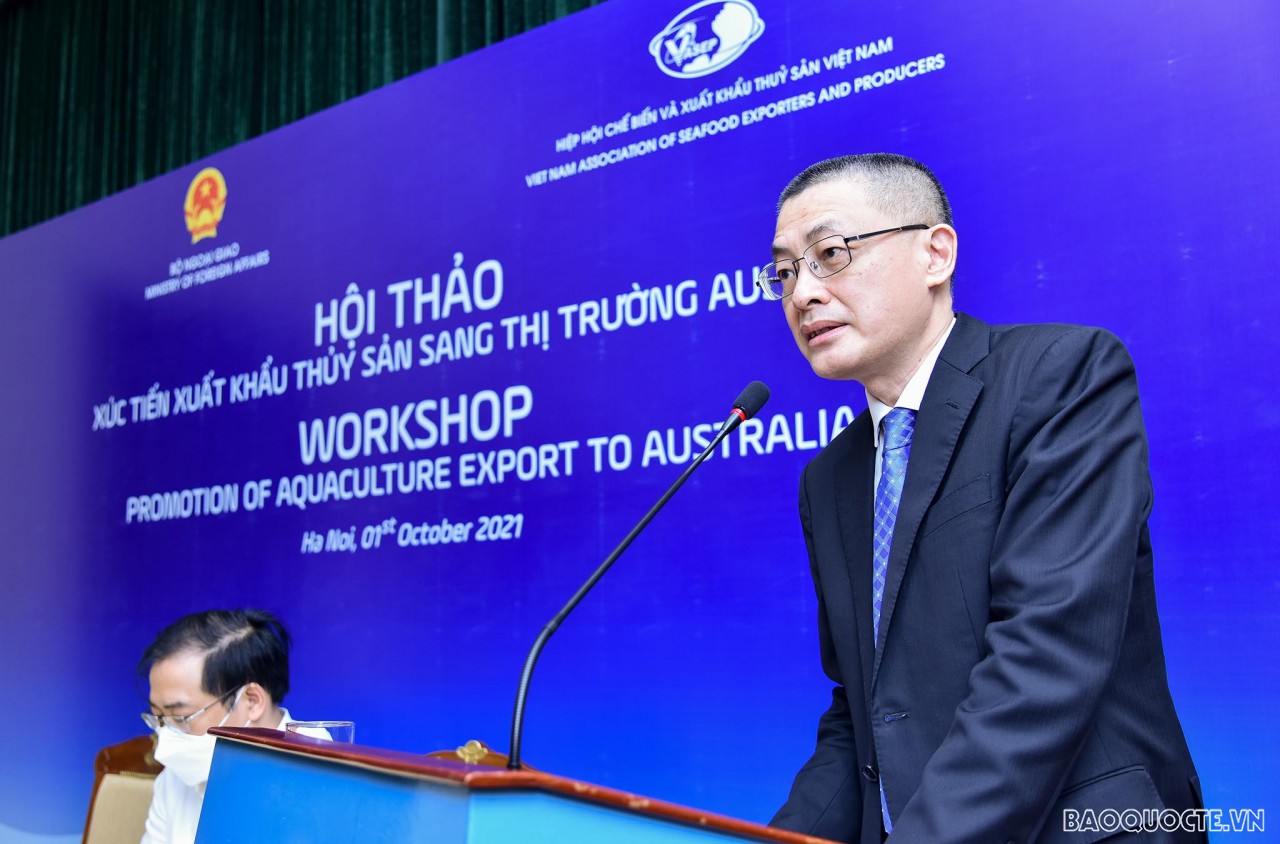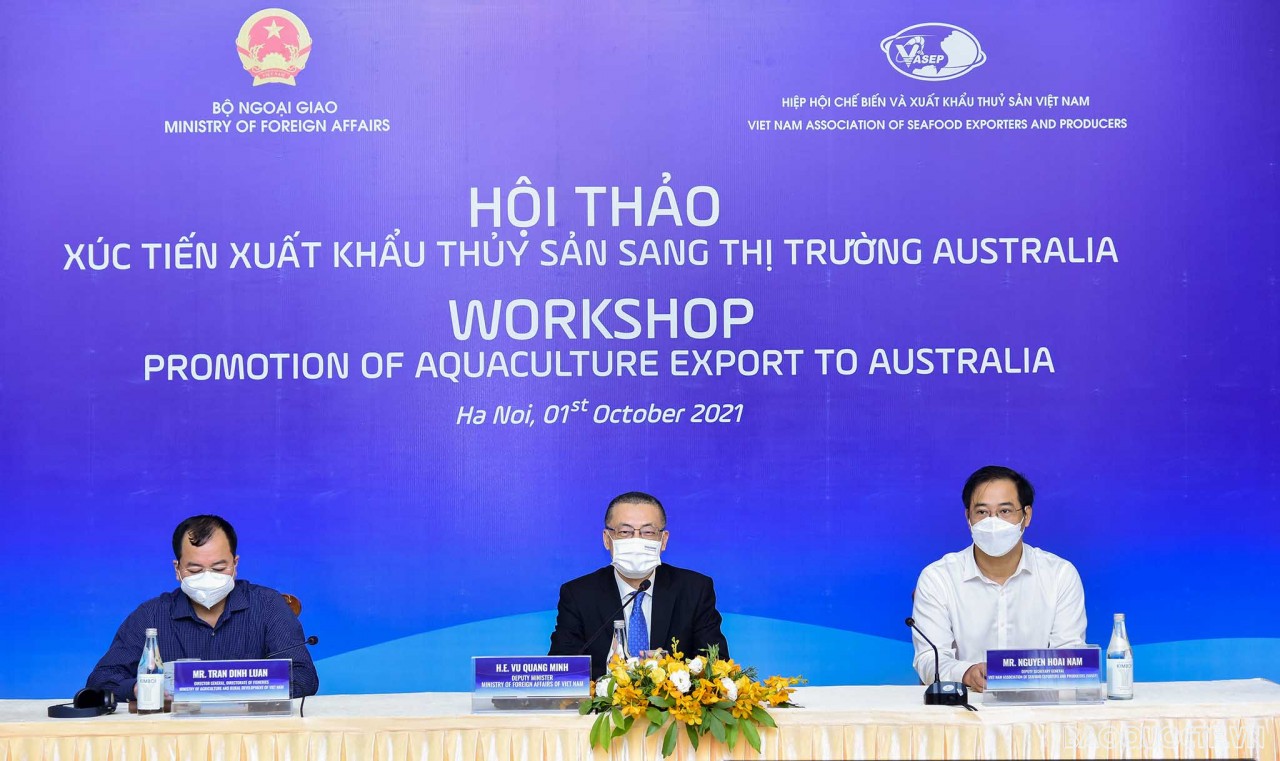
Seafood exports: 'Bright spot' in Viet Nam-Australia trade relations
Latest
 |
| Deputy Foreign Minister Vu Quang Minh spoke at the workshop on the promotion of aquaculture export to Australia. (Photo: Nguyen Hong) |
That was the comment shared by the delegates at the seminar on promoting seafood exports to the Australian market hosted by the Department of General Economic Affairs in collaboration with the Viet Nam Association of Seafood Exporters and Producers (VASEP) and other representative agencies of Viet Nam in Australia recently.
The event was held to implement the resolution of the 13th Party Congress, deploy the Economic Diplomacy plan in 2021 of the Ministry of Foreign Affairs to support key export industries (fisheries, textiles, vegetables, etc.) to overcome difficulties caused by the impact of the COVID-19 epidemic and contribute to economic recovery.
Australian consumers highly speak of Vietnamese seafood
According to Deputy Foreign Minister Vu Quang Minh, in the context of unceasingly developing Viet Nam-Australia relations, seafood plays a key role and is a key export industry in bilateral trade.
Despite the negative impact of the COVID-19 pandemic, Viet Nam's seafood exports to Australia keep on increasing over time.
In the first 7 months of 2021, seafood exports to Australia reached 1.16 million tons, worth nearly 5 billion USD, up 11% in volume, 13% in value compared to the same period of 2020. Especially, in the 8 months of 2021, Viet Nam's seafood exports to Australia increased by 35% over the same period last year.
With the advantages and preferential tariffs that Australia offers to developing countries, Vietnamese seafood enjoys 0% tax. In the context of COVID-19, Australia is an active export market for Vietnamese seafood to the bloc of countries participating in the Comprehensive and Progressive Agreement for Trans-Pacific Partnership (CPTPP).
The Vietnamese Government is stepping up the implementation of measures to control and safely adapt to the epidemic, recover and develop the economy in the new normal.
Australia is a large market with strict requirements for food quality and safety. Viet Nam has been making great efforts to meet those requirements and adapt to the new context, especially in digital transformation and product quality management.
The COVID-19 pandemic had a heavy impact on the economies of the two countries. However, the two governments and people have made their utmost efforts to overcome it, said the Australian Deputy Minister of Agriculture, Water Resources and Environment Andrew Metcalfe.
Both sides have the same desire to increase trade and people's income, create more jobs, facilitate trade, and contribute to bilateral relations.
In 2020, Viet Nam's shrimp exports to Australia reached 220 million USD, an increase of 20 million USD compared to 2019.
Australia has been a long-term partner and the 7th largest export market of Viet Nam's seafood industry with main products such as shrimp, tuna, basa...
In particular, Viet Nam continues to be the largest supplier of shrimp products to Australia since 2012 and the third-largest supplier of seafood to Australia from 2018 to 2020 with a turnover of more than 20 million USD per year.
According to Deputy Minister Andrew Metcalfe, Australian consumers highly evaluate Vietnamese seafood products as well as the effort to meet the requirements for product quality.
In order for Vietnamese seafood to be more present in the Australian market, Mr. Metcalfe stated that the two sides need to strengthen cooperation in information sharing and technical support for Vietnamese producers to meet the requirements of Australian quarantine standards.
 |
| Delegates at the event. (Photo: Nguyen Hong) |
Take advantage of FTAs, accelerate digital transformation
Talking at the workshop, Australian delegates shared with Vietnamese businesses about import regulations for specific products such as shrimp, fish (including salmon and other types of fish), and the regulation of quarantine, food safety and biosecurity.
Representatives of the Australian Department of Agriculture, Water Resources and Environment introduced websites and focal points to discuss detailed regulations for aquatic products imported into this market.
In addition, in order to take advantage of the free trade agreements (FTAs) between ASEAN and Australia and New Zealand (AANZFTA), the CPTPP, the Regional Comprehensive Economic Partnership (RCEP) of which the two countries are members, Vietnamese enterprises need to strengthen cooperation related to testing procedures in ANZFTA which can create favorable conditions for Vietnamese seafood exports in the coming time.
At the same time, the application of SPS (sanitary and phytosanitary standards) by businesses in the AANZFTA Agreement will reduce the possibility of trade disruption and help Viet Nam's aquaculture industry take advantage of easier market access opportunities.
In the context of the COVID-19 pandemic having a serious impact on trade flows and promoting digital transformation, Australian importers emphasized that Viet Nam needs to quickly switch to the application of electronic certification because this is a prerequisite to making the process of seafood exporting safer and at a lower cost.
In addition, digital transformation also helps Viet Nam maintain a competitive advantage in seafood products, not only in the Australian market but also in other markets.
Accoring to Ms. To Thi Tuong Lan, Deputy Secretary General of VASEP, Vietnamese seafood has met the standards of Global GAP, ASC, traceability for exporting to the most developed markets. Viet Nam currently has 625 seafood processing factories eligible for export to the European Union, nearly 100 factories qualified for export to the US.
In the coming time, Viet Nam plans to increase the application of science and technology, meet production standards along with environmental protection, produce in a closed chain, and strengthen cooperation with international organizations to monitor production processes, and promote food and biosafety research.
Viet Nam is also one of the leading countries in applying sustainable strategies in aquaculture production, processing and farming.
Currently, to meet the increasingly strict demands of the market, many businesses have invested in a closed chain from seed, feed, to finished products, connect chains to better control food safety and ensure traceability.
The Director General of the Directorate of Fisheries Tran Dinh Luan affirmed that in the coming time, Viet Nam's seafood industry will continue to develop a chain of cooperative groups; promoting public-private partnerships to join the chain to monitor and supervise in production, purchasing, ensuring food safety, traceability, publicity and transparency in production, environmental protection, quality assurance, meeting social security requirements.
Obviously, Vietnamese enterprises in general and seafood enterprises, in particular, have advantages in terms of products in the large Australian market, where there is a community of more than 320,000 Vietnamese people.
In order to further promote bilateral trade, it is necessary to strengthen cooperation, through promotion and communication, especially the improvement of product quality to meet the strict requirements of the market.
As the 4.0 era poses greater requirements, it is necessary to use technology much more than previous periods to respond in a timely manner. In addition, FTAs will act as a bridge, opening up great opportunities for Vietnamese seafood to further penetrate into the market of Australia.
| The 13th Congress of the Party stated the need to implement synchronously, creatively and effectively the external relations, proactively and actively integrate into the world comprehensively and deeply. In order to further concretize and improve the proactiveness and effectiveness of international activities, the Political Report of the 13th National Congress emphasized: "Actively participate, positively contribute, and enhance the role of Viet Nam in building and shaping multilateral institutions and the international political-economic order, fully implementing international commitments and signed trade agreements". |

























